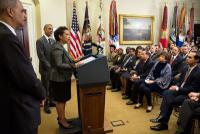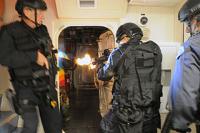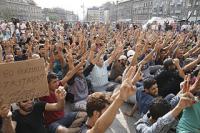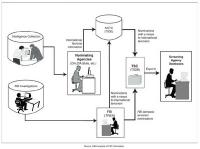-
U.K. arrests record number of terrorism suspects, especially women, teenagers

According to the U.K. Home Office quarterly bulletin, 315 terror suspects – a record — have been arrested in the United Kingdom in the past year, with a sharp increases in arrests of women and teenagers. Therise in the number of terrorism-related suspects arrested is a reflection of the determined effort by the police and security services to address the ISIS threat and stem the flow of Britons to, and from, Syria.
-
-
U.K. university suspends Islamic society over hosting hate speakers

Queen Mary University of London has suspended the Islamic society at the university after the students’ union has launched an investigation into possible violations of protocols and procedures by the society. the society has been accused in the past of hosting events in which radical Islamist speakers, including speakers associated with Islamist fundamentalist groups. The U.K. government said that at least seventy events featuring hate speakers were held on U.K. campuses last year.
-
-
Loretta Lynch: No evidence San Bernardino shooters part of a cell

Some U.S. media reports said one of the San Bernardino shooters, Syed Rizwan Farook, may have been plotting an earlier attack in California with someone else, possibly as early as 2012. U.S. attorney general, Loretta Lynch, on a visit to London today (Wednesday), said, however, that there is no evidence yet that Farook and his wife had planned any other attacks or were part of a wider conspiracy.
-
-
Civil liberties coalition condemns cybersecurity bill

Civil libertarians in the United States have a new ally in the fight against the new surveillance bill now being considered in Congress: librarians. The critics of the bill call it both “unhelpful” and “dangerous to Americans’ civil liberties.” House speaker Paul Ryan (R-Wisconsin) has been actively pushing for reconciliation of two bills, the Protecting Cyber Networks Act (PCNA) and the National Cybersecurity Protection Advancement with the Cybersecurity Information Sharing Act of 2015 (CISA), which passed a Senate vote in October.
-
-
Paris attacks expose weaknesses in Europe’s security structure

The 13 November attacks in Paris offered a painful demonstration of Europe’s security loopholes which the terrorists exploited to their advantage. The attacks should serve as a wake-up call to Europeans that the continental security structure, built in another era, is no longer sufficient and needs to be adapted to new circumstances. Whether or not such adaptations can be made, and made in time before the terrorists decide to launch another attack, is an open question.
-
-
Improving police responses to mass shootings

Before Columbine, law enforcement acted on the assumption that mass casualty incidents would involve a barricaded lone shooter who could be isolated, or a hostage situation in which the attackers would engage in negotiation before they killed more people. Thus, protocols established after the 1966 sniper attack at the University of Texas, called for first responders in the United States to set up a perimeter around the site of the shooting, gather as much information as possible, and then wait for specially trained assault teams, hostage negotiators, medics, and other specialists to arrive. “The assumption,” one expert said, “was that time was on their side.” Police forces arriving on the scene of a shooting no longer entertain this assumption.
-
-
It’s time to repeal the gun industry’s exceptional legal immunity

Coming up with effective and realistic solutions to curb gun violence is not easy. Guns pose a tricky dilemma, because they can be used to do good or bad things. They can be used to commit heinous crimes, but they can be used to protect lives as well. The challenge for lawmakers is to come up with ways to reduce the risk of criminal misuse of guns while preserving and even promoting the likelihood of guns being used in beneficial ways. Ensuring that every firearm manufacturer and dealer operates as safely and responsibly as possible should be one piece of the puzzle. A key way to ensure that gun companies have the right incentives would be to repeal the Protection of Lawful Commerce in Arms Act. Enacted in 2005, this federal law gave gun sellers a special immunity from legal responsibilities, which is not enjoyed by any other industry. Gun manufacturers and dealers should not be subject to any extraordinary forms of liability that do not apply to other products. They should not be liable, for example, merely because a firearm is a weapon that is capable of being used to do harm. But if a gun manufacturer or dealer fails to take basic, reasonable precautions in distributing products, it should be held accountable under the law just as an irresponsible company in any other business would be. With the risks of firearms in the wrong hands becoming ever more apparent, Congress should reconsider its regrettable decision to give the gun industry special immunity from legal responsibility.
-
-
Refugee system “vulnerable to exploitation from extremist groups”: U.S. intelligence

On Monday, in his inaugural State of Homeland Security Address, House Homeland Security Committee chairman Michael McCaul (R-Texas) highlighted new concerns regarding refugees with ties to terrorist groups in Syria who might try to enter the United States. He revealed that a letter sent to him earlier this year by the Office of the Director of National Intelligence stated that “The refugee system, like all immigration programs, is vulnerable to exploitation from extremist groups seeking to send operatives to the West.”
-
-
French regional elections: No one can dismiss Le Pen as an also-ran now

Marine Le Pen probably won’t be the next president of France, but the regional elections are proving that her Front National has truly become a major player. Le Pen’s party has taken 28 percent of the vote in the first of two rounds to elect regional assemblies. The right-wing Republicans, led by former president Nicolas Sarkozy, came a close second, with a shade under 27 percent. The ruling Socialist Party trailed, with just 23 percent of the vote. There is one week to go until the decisive second round, but even if the left and right somehow manage to block their path, the FN has already struck a major blow ahead of the presidential election in 2017.
-
-
Untraceable communication -- guaranteed
Anonymity networks, which sit on top of the public Internet, are designed to conceal people’s Web-browsing habits from prying eyes. The most popular of these, Tor, has been around for more than a decade and is used by millions of people every day. Recent research, however, has shown that adversaries can infer a great deal about the sources of supposedly anonymous communications by monitoring data traffic though just a few well-chosen nodes in an anonymity network. Researchers have developed a new, untraceable text-messaging system designed to thwart even the most powerful of adversaries.
-
-
Trump Calls for preventing all Muslims, including immigrants and tourists, from entering U.S.
In what must be seen as an extraordinary rhetorical escalation even for a presidential candidate not known for nuance and subtlety, Donald J. Trump on Monday called for the United States to prevent all Muslims, without exception, from entering the United States until the country’s leaders and security agencies can “figure out what is going on.” Trump’s campaign manager Corey Lewandowski told the Associated Press that the ban would apply to “everybody,” including both immigrants and tourists.
-
-
Obama: Current strategy to defeat ISIS more likely to succeed than alternatives

President Barack Obama, in a rare prime-time address from the White House – the third such appearance in his seven years as president — described the current U.S. strategy against ISIS as more likely to succeed, and more acceptable to the American people, than alternatives such as large increase in U.S. ground forces in Syria and Iraq. Describing those who perpetrated the Sam Bernardino attack as individuals who had “gone down the dark path of radicalization,” he reassured the American people that the United States has faced, and has overcome, more daunting challenges than terrorism. He said that the best strategy to defeat ISIS without further radicalizing Muslims who live in the West is the current mix of airstrikes, support for local allies, diplomacy to end the Syrian war, and a measured increase in the number of U.S. Special Forces.
-
-
Obama’s address on countering ISIS: The missing context
Yesterday, President Barack Obama delivered a prime time address on his administration’s policy to defeat ISIS. Obama offered no new initiatives or ideas, but the address still mentioned all the right things: No one wants to send tens of thousands of American troops to the Middle Eat; no one wants the United States to invade and occupy another country; we should not equate Islam with terrorism; we should guard against anti-Muslim backlash; the United States has faced daunting challenges in the past, and came out victorious. What was missing from the address was the same thing which has been missing from the Obama’ administration’s Middle East policies and its approach to fighting ISIS: Context.
-
-
Western intelligence agencies a step behind ISIS operations in the West
A former U.S. intelligence officer says the intelligence community had not fully grasped the menace ISIS posed, and fully appreciate the organization’s mode of operation. As a result, intelligence agencies in the United States and Europe have been playing catch up in a desperate effort to try and check the terrorist organisation.
-
-
72 DHS employees were found to be on the terrorist watch-list

Representative Stephen Lynch (D-Massachusetts) was among the forty-seven Democrats who supported a GOP bill to tighten screening requirements for Syrian and Iraqi refugees. He explains: “I have very low confidence [in DHS’s ability to vet refugees] based on empirical data that we’ve got on the Department of Homeland Security. I think we desperately need another set of eyeballs looking at the vetting process.” He also revealed that a DHS IG investigation found that seventy-two DHS employees were on the terrorist watch list.
-
More headlines
The long view
Factories First: Winning the Drone War Before It Starts
Wars are won by factories before they are won on the battlefield,Martin C. Feldmann writes, noting that the United States lacks the manufacturing depth for the coming drone age. Rectifying this situation “will take far more than procurement tweaks,” Feldmann writes. “It demands a national-level, wartime-scale industrial mobilization.”
No Nation Is an Island: The Dangers of Modern U.S. Isolationism
The resurgence of isolationist sentiment in American politics is understandable but misguided. While the desire to refocus on domestic renewal is justified, retreating from the world will not bring the security, prosperity, or sovereignty that its proponents promise. On the contrary, it invites instability, diminishes U.S. influence, and erodes the democratic order the U.S. helped forge.
Fragmented by Design: USAID’s Dismantling and the Future of American Foreign Aid
The Trump administration launched an aggressive restructuring of U.S. foreign aid, effectively dismantling the United States Agency for International Development (USAID). The humanitarian and geopolitical fallout of the demise of USAID includes shuttered clinics, destroyed food aid, and China’s growing influence in the global south. This new era of American soft power will determine how, and whether, the U.S. continues to lead in global development.
Water Wars: A Historic Agreement Between Mexico and US Is Ramping Up Border Tension
As climate change drives rising temperatures and changes in rainfall, Mexico and the US are in the middle of a conflict over water, putting an additional strain on their relationship. Partly due to constant droughts, Mexico has struggled to maintain its water deliveries for much of the last 25 years, deliveries to which it is obligated by a 1944 water-sharing agreement between the two countries.
How Disastrous Was the Trump-Putin Meeting?
In Alaska, Trump got played by Putin. Therefore, Steven Pifer writes, the European leaders and Zelensky have to “diplomatically offer suggestions to walk Trump back from a position that he does not appear to understand would be bad for Ukraine, bad for Europe, and bad for American interests. And they have to do so without setting off an explosion that could disrupt U.S.-Ukrainian and U.S.-European relations—all to the delight of Putin and the Kremlin.”
How Male Grievance Fuels Radicalization and Extremist Violence
Social extremism is evolving in reach and form. While traditional racial supremacy ideologies remain, contemporary movements are now often fueled by something more personal and emotionally resonant: male grievance.
